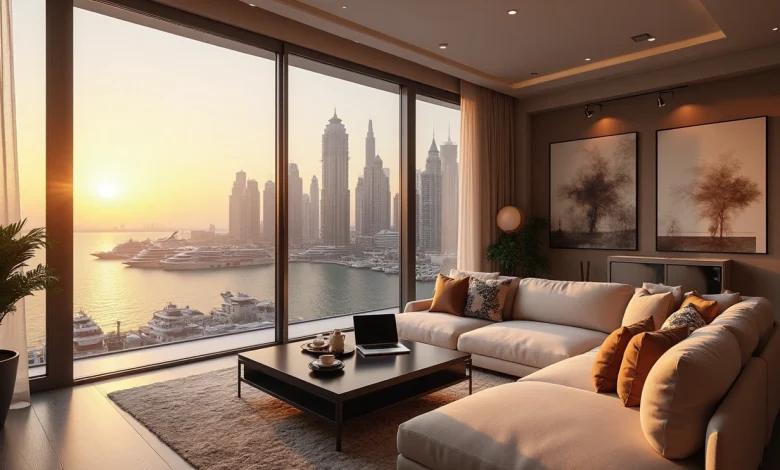
Are Dubai’s Short-Term Rentals Worth Your Money Now?
Dubai’s short-term rental market hit $1.4 billion in 2023, which makes us ask: Do Dubai’s short-stay rentals still give you good value for your money? The numbers look promising. Knight Frank’s 2023 UAE real estate report shows properties on Airbnb or Dubizzle Homes can earn 20% to 40% more yearly than traditional long-term leases.
The rental market has seen big changes in 2024, with prices jumping 13.5% in just six months. This upward trend looks set to continue, with experts predicting short-term rental prices will climb another 18% in 2025. The luxury residential rental segment has done even better, with prices shooting up 23.5% in 2024 and beating the market’s 2016 peak.
Dubai’s booming tourism sector drives this impressive growth. The city attracted 16.79 million international tourists from January to November 2024—9% more than the same time in 2023. On top of that, Dubai’s population could reach 5.8 million according to the city’s 2040 Urban Master Plan, thanks to immigration and new talent flowing into various sectors.
This piece gets into whether Dubai’s short-term rentals are still a good investment now, points out the best areas to invest, and highlights what landlords and tenants should think over in this ever-changing sector.
Dubai’s Most Profitable Areas for Short-Term Rentals
Location serves as the life-blood of success in Dubai’s short-term rental market. Smart investors who identify high-yield neighborhoods can make the difference between a lucrative investment and a mediocre one.
Luxury zones: Dubai Marina, Downtown, JBR
Dubai’s short-term rental market remains dominated by the premium segment. Dubai Marina stands out with average daily rates of AED 750-1,200 and annual returns between 8-10%. Tourists flock to this waterfront district because it’s close to restaurants, beaches, and The Walk JBR promenade.
Downtown Dubai’s properties, next to the iconic Burj Khalifa, command similar rates with occupancy rates averaging 75-80% year-round. Jumeirah Beach Residence (JBR) properties keep steady demand thanks to direct beach access, and nightly rates range from AED 800-1,500 based on views and amenities.
Mid-tier picks: JVC, Business Bay, Al Barsha
Jumeirah Village Circle (JVC) gives investors with moderate budgets a great balance of affordability and returns. JVC’s properties rent for AED 350-600 per night with annual yields reaching 6-8%. Business Bay has become a strong contender in this category and draws corporate travelers with occupancy rates hitting 70% during peak business seasons.
Mall of Emirates’ neighbor, Al Barsha, offers easy access to transportation and shopping that families love. These mid-tier areas typically deliver 5-7% higher returns compared to their long-term rental counterparts.
Affordable hotspots: Deira, Bur Dubai, International City
Budget-friendly areas like Deira and Bur Dubai thrive on their authentic cultural atmosphere and closeness to historic sites. These neighborhoods typically earn AED 200-350 per night with occupancy rates of 65-70%, attracting budget-conscious tourists and business travelers.
International City presents the most affordable entry point into Dubai’s short-term rental market, with nightly rates around AED 150-250. While the absolute returns might be lower, the original investment costs much less, which leads to ROI percentages that match mid-tier areas.
Properties within walking distance of metro stations or major attractions perform better than their less available counterparts. These prime locations can command a 15-20% premium in both occupancy and rates.
Are Dubai’s Short-Stay Rentals Still Offering Value for Money?

The financial metrics of Dubai’s short-term rental market show exciting opportunities for investors in 2024.
Rental rate trends in 2024 and 2025
Dubai’s rental rates have shown remarkable resilience since 2023. Average short-term rental prices have climbed by 15% in popular districts. Premium properties in areas like Palm Jumeirah have seen even steeper increases, with rates jumping by 22% year-over-year. Notwithstanding that, this growth looks sustainable as occupancy rates stay strong at 76% across the emirate – by a lot above the global average of 68% for comparable urban destinations.
Market experts predict continued growth through 2025, though at a steadier pace of 8-10%. This change reflects market maturation rather than weakening demand as Dubai strengthens its position as a premier global destination.
Daily vs monthly rental profitability
A substantial gap exists between daily and monthly rental profits. Properties run as daily rentals typically earn 30-40% higher annual returns compared to monthly arrangements. To cite an instance, a one-bedroom apartment in Dubai Marina that commands AED 350 per night equals about AED 8,400 monthly after vacancy periods. This amount outperforms the AED 6,000 average for conventional monthly rentals in the same area by a lot.
Monthly short-term rentals provide less management intensity and better predictability. These features make them perfect for investors who want to balance returns with simpler operations.
Tenant demand and pricing flexibility
Dubai’s tenant market continues to vary. Digital nomads and extended-stay business travelers have emerged as primary demand drivers alongside traditional tourists. These groups usually book stays of 2-4 weeks, creating a profitable middle ground between nightly and conventional annual leases.
Price flexibility remains a vital advantage. Seasonal adjustments help owners maximize returns during peak periods. Properties with flexible pricing consistently earn 15-25% more in annual revenue than fixed-rate models. Yes, it is clear that Dubai’s short-term rentals are a great way to get value for money in today’s market.
Landlord Considerations Before Entering the Market
Property owners who want to profit from Dubai’s short-term rental market need to meet several significant requirements. Short-term rentals follow different legal frameworks and operational guidelines compared to traditional long-term leasing.
Regulatory compliance and permits
A holiday home permit from the Department of Economy and Tourism (DET) remains mandatory for all short-term rental properties. Property owners can register up to 8 properties before they need a commercial trade license. The DET Holiday Homes portal allows users to create an account, submit documents, and pay fees.
Required paperwork includes the property’s title deed, owner’s passport or Emirates ID, and a recent DEWA bill. Tenants who sublet properties must get a No Objection Certificate from their landlord. The permit fees vary from AED 370 for studios to AED 1,270 for four-bedroom units, plus an annual registration fee of AED 1,520.
Furnishing and setup costs
Furnished properties earn 20-30% more rent than unfurnished ones. The higher returns require substantial upfront investment. Property owners spend between AED 30,000 for simple setups to AED 150,000 for luxury properties.
Furniture packages help streamline the setup process. These ready-made solutions include core furniture pieces and arrive within 7-10 working days after payment. Some vendors provide “turn-key” packages that come with kitchen crockery, bathroom accessories, and electrical appliances.
Property owners should evaluate the payback period to see if higher rental income justifies their furnishing investment. The costs of regular maintenance and furniture replacement add up over time.
Hiring property management services
Property management companies provide detailed services that help overseas investors and hands-off owners. These firms take care of permit applications, guest check-ins, cleaning, and maintenance.
Management services typically charge 10-15% of rental income. Their services include professional marketing on multiple booking platforms, round-the-clock guest support, and regulatory compliance management.
These companies ensure properties meet DET standards. They handle monthly Tourism Dirham fee payments and submit guest passport copies at check-in – key requirements to maintain permit compliance.
What Tenants and Digital Nomads Are Looking For

Landlords need to understand what tenants want to make the most of their investment in Dubai’s ever-changing short-term rental market.
Top amenities in need
High-speed internet stands out as the most vital amenity for tourists and digital nomads. Properties that highlight reliable connectivity get 45% more rental requests than others. Tenants also look for fully equipped kitchens, laundry facilities, and dedicated workspaces.
Most tenants place safety at the top of their priorities – gated communities or 24-hour security. Covered parking comes up first when potential renters ask questions. Many will pay extra for shaded spots during summer.
Balconies, terraces, and garden access have grown more valuable to tenants. Properties with gym access or swimming pools attract fitness-minded renters. These features often seal the deal in rental decisions.
Visa policies and remote work influence
Dubai’s short-term rental demand has jumped thanks to new specialized visa programs. Remote workers can now live in Dubai while working for overseas companies through the Virtual Working Program. They need to earn at least USD 5,000 monthly.
The program gives great benefits – zero income tax, strong digital infrastructure, and the option to sponsor family members. Many properties now include office spaces, quiet meeting areas, and easy access to co-working spaces to attract these remote workers.
Why short-term stays are better than hotels
Short-term rentals save money, especially for longer stays. Guests can cook meals instead of eating out, which adds up to big savings.
These places offer more than just cost benefits. Tenants enjoy flexible check-in times and daily schedules. They get more privacy and space compared to regular hotel rooms.
Rental properties let visitors experience real local culture. Many choose to stay in residential areas to connect with the city beyond tourist spots.
Final Thoughts on Dubai’s Short-Term Rental Market
Dubai’s short-term rental market is a compelling investment choice for property owners in 2024 and beyond. The market shows remarkable strength with 13.5% price increases in the first half of 2024. The outlook remains bright as experts predict an 18% rise in 2025.
Your property’s location can make or break your success. Prime spots like Dubai Marina and Downtown can fetch top dollar at AED 750-1,500 per night. Mid-tier areas such as JVC and Business Bay strike a good balance with returns. You can still find good deals in Deira and International City if you’re working with a tighter budget, though returns might be modest.
Short-term rentals beat traditional long-term leases by 20-40% in yearly income. This comes with extra work though. Property owners need to get their DET permits and keep proper documentation. Beyond buying the property, you’ll need AED 30,000 to AED 150,000 for furnishing, depending on how luxurious you want to go.
Digital nomads and long-stay travelers are reshaping the market, thanks to UAE’s new visa programs. These guests want fast internet, good work areas, and real local experiences rather than typical hotel stays.
Dubai’s short-term rental scene offers great potential if you’re ready to handle the rules and meet what today’s tenants want. Tourism growth, more people moving in, and flexible living preferences create steady rental demand. While setup costs and management take work, the higher returns from short-term rentals make sense for most investors.






